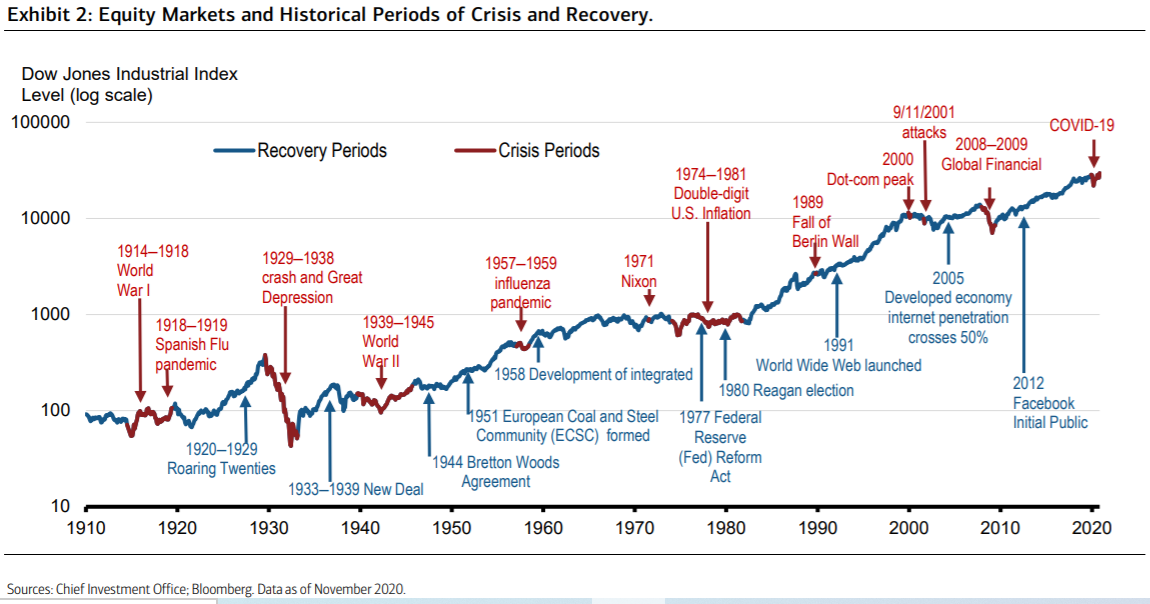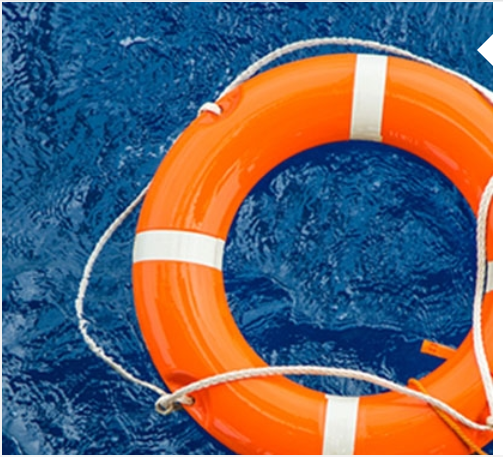Merrill drager en optimistisk lære – i 10 punkter – af 2020 trods coronakrisen og den økonomiske nedtur. Kriser skaber altid en ny dynamik, som også aflæses i aktiemarkederne. Nogle af konsekvenserne af krisen er, at regeringer har fået en stærkere rolle, at globaliseringen ikke er død, og at der kommer en hårdere konkurrence mellem USA og Kina – og at sundhed i mennesker som i samfund har betydning for, hvordan vi kommer gennem kriser.
What We Learned in 2020
With this being the last Capital Market Outlook publication of 2020, we thought it would
be a good time to look back on the key lessons of an extraordinary year. 2020 is replete
with teachable moments, and in that spirit, here are our top 10 lessons of 2020.
Lesson 1: All Crises Are Accelerants—And Coronavirus Is No Different.
Past crises or shocks often pull forward the future and give way to rejuvenated periods of
growth, innovation and development (Exhibit 2). As we wrote earlier this year, “the early
20th century included a world war and a global flu pandemic. The 1930s saw an economic
depression and military conflict on an even larger scale. The 1970s was a period of
economic stagnation and high inflation. And the first decade of the new millennium
brought the collapse of a stock market bubble, the rise of global terrorism and a financial
crash.
Crucially, each of these historical crisis periods was ultimately succeeded by an
economic revival, a more favorable investment environment and sustained price gains for
equity markets.” The pandemic of 2020 will be no different.

Lesson 2: Policy Makers Learned And Applied The Lessons Of History
Fortunately, policy makers took to heart one of the key lessons of the Great Financial
Crisis: Go big and go fast when it comes to the policy response amid collapsing economic
growth and cratering confidence in the capital markets. The pandemic’s unprecedented
shock to the global economy was matched by unprecedented policy responses from
around the world. Think “double-barreled bazookas”—with policy makers (fiscal) and
central banks (monetary) flooding the capital markets with trillions of dollars of liquidity as
the coronavirus jumped borders.
Lesson 3: Health = Wealth
If we have learned anything from this pandemic, it’s that health is a fundamental
determinant to economic growth. The healthier the population, the stronger, more
dynamic and competitive the economy. Sick nations, in contrast, are handicapped in terms
of production, consumption and aggregate growth.
Lesson 4: The “Commanding Heights” Now Belong To The Government
Ronald Reagan once said, “Government is not the solution to our problem. Government is
the problem.” Not anymore. Times have changed. Along with the rise of China, the
unprecedented global healthcare crisis has swung the pendulum of control of the
“Commanding Heights”—or the most important elements of the economy—back to the
state, away from the markets. This seismic shift was underway before the crisis but has
gained more momentum. There is rising bipartisan support for a U.S. industrial policy in
such key sectors as aerospace, electronics, rare earth minerals, telecom, agriculture and
other sectors deemed vital to national security.
Lesson 5: It’s Too Soon To Write Off Globalization
Populism, protectionism and the pandemic are headwinds to a more integrated global
economy and have sparked a debate about the risks of de-globalization. We are more
sanguine. A more multilaterally minded President-elect Biden administration; “sticky”
global supply chains; the stronger-than-expected rebound in global trade; and greater
crossborder service activities as the world goes digital—all are signs that augur for
greater globalization, not less. As we recently noted, there is no better example of
globalization being alive and well than the Pfizer/BioNTech vaccine—the world’s first
coronavirus vaccine approved for mass use. As the Financial Times recently noted: “the
vaccine was developed in Germany by the children of Turkish immigrants; tested in
Germany, the U.S., Turkey, South Africa, Brazil and Argentina; manufactured in Belgium and
first approved in the U.K.”
Lesson 6: U.S.-China Relations: Is This Time Different
There were glimmers of hope that U.S.-Sino relations would improve this year, buttressed
by the signing of the Phase One trade deal in January 2020. The pandemic, however, only
served to amplify the differences between the two nations in trade, technology, foreign
investment and a host of geopolitical hot spots (Hong Kong, the South China Sea, etc.). We
learned this year that it’s different this time in our view—that the U.S. and China have
entered an era of great power competition that will likely play out over the next few years,
if not decades.
Lesson 7: Europe—More United Than Divided
When the pandemic struck early this year, Europe did what it does best: It dithered and
became more divided in fashioning a policy response. Border restrictions among member
states were erected in a confusing and uncoordinated way, growth declined, nationalism
soared, and the risks of Europe collapsing skyrocketed. Thereafter, however, Europe’s
principal institutions—the European Commission, the European Council and the European
Central Bank (ECB)—swung into action and crafted a number of pro-growth policies that
stunned investors and even the most diehard Euroskeptics.
Lesson 8: Some Cuts Are Deeper Than Others
Early in the pandemic, and with the coronavirus mutating all over the world, coronavirus
was described as the “great equalizer”—i.e., that everyone was at risk from the disease. In
practical terms, that’s true. In reality, it’s not even close. The pandemic has taught that
we’re not created equal—some cuts are deeper than others.
In a nutshell, the pandemic has exacerbated and exposed numerous inequalities, a lesson
investors and policy makers ignored at their own peril.
Lesson 9: Climate Change Can Be Slowed
Something untoward happened when the world went into shutdown earlier this year: The
skies in Delhi, one of the most polluted cities in the world, cleared, while in other parts of
India, the majestic Himalayas became visible for the first time in decades. In China,
another major global polluter, emissions dropped by roughly 25% at peak shutdown over
March. In some of the largest cities in the world, like Delhi, Sao Paulo and New York, levels
of fine particulate matter known as PM2.5 fell dramatically, by 25% to 60% in many cases.
Heeding this lesson, mitigating climate risks remains a key objective of governments and corporations around the world, creating investment opportunities across a spectrum of industries—solar, wind, electrical vehicles, water, waste management, storage and distribution, and related activities.
Lesson 10: Never Bet Against America
The final lesson of 2020 is never bet against the dynamic, resilient U.S. economy—warts
and all. Yes, the war against coronavirus has yet to be won—we are not out of the woods
yet. In addition, the nation confronts a number of structural issues heading into 2021. But
think how far we have come since the dark days of March and April, when the markets and
economy were in a “free fall”. As we close out the year, the S&P and other major indexes
are hovering at all-time highs—a turn unimaginable back in the dark days of spring. The
pandemic is a lesson on how adaptable the country is to extraordinary change—or to a
once-in-a-century shock.
We end were we began: The key lesson/takeaway of Exhibit 2 is that history is always
replete with crises and challenges, but these event risks are also opportunities for
investors who can see the forest before the trees. History shows that markets and the
economy tend to bend but not break. That’s another way of saying stay long U.S. equities.











